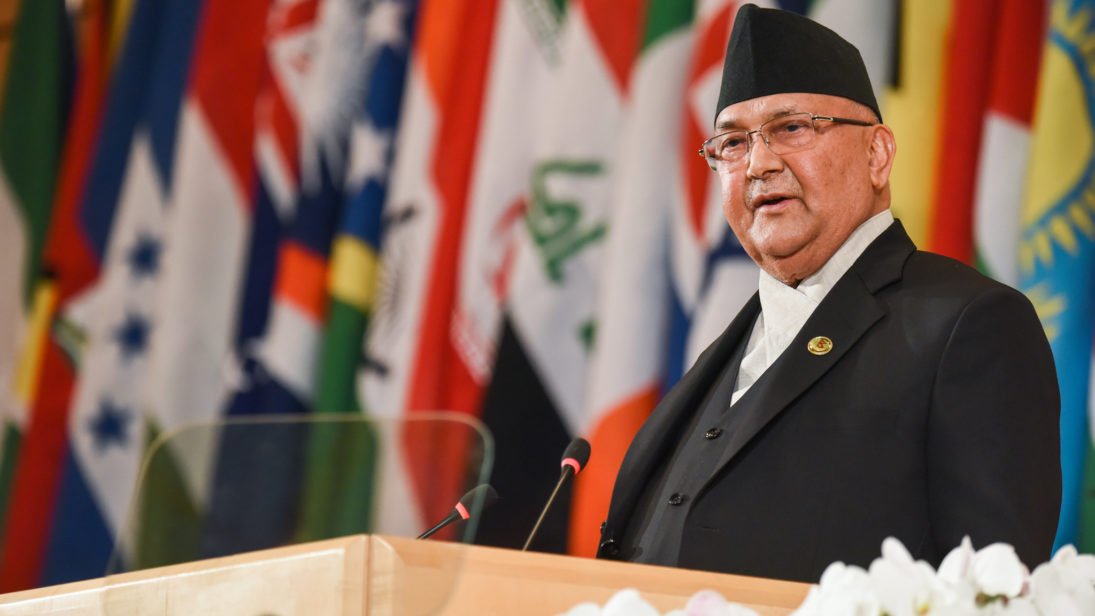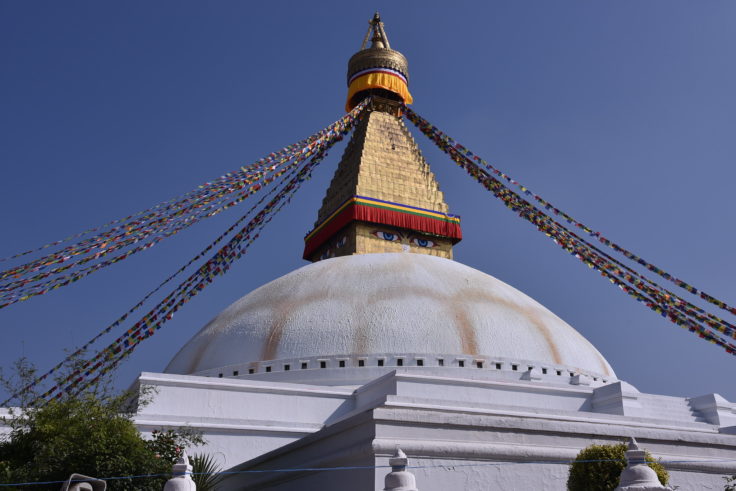
Nepal’s domestic politics have been undergoing a turbulent and significant shift. On December 20, 2020, at the recommendation of Prime Minister KP Sharma Oli, President Bidya Devi Bhandari dissolved the House of Representatives, calling for snap elections in April and May 2021. Oli’s move was a result of a serious internal rift within the ruling Nepal Communist Party (NCP) that threatened to depose him from power. Opposition parties and other civil society stakeholders have condemned the move as unconstitutional and several writs have been filed against the move at the Supreme Court (SC) with hearings underway. Massive protests have taken place condemning the prime minister’s move. If the SC reinstates the parliament, Oli is in course to lose the moral authority to govern and could be subject to a vote of no-confidence. If the SC validates his move, it is unclear if he would be able to return to power with a majority.
The formation of a strong government after decades of political instability was expected to lead to a socioeconomic transformation of Nepal. Regardless of the SC’s decision, the country is likely to see an escalation of political tensions in the days ahead. The internal rift that led to the December parliamentary dissolution and the political dimensions of the current predicament along with the domestic and geopolitical implications of internal political instability will lead to a serious and long-term weakening of Nepal’s democratic fabric.
Power Sharing and Legitimacy in the NCP
Differences between NCP chairs Oli and former Prime Minister Pushpa Kamal Dahal have largely premised on a power-sharing arrangement, leading to a vertical division in the party. In the December 2017 parliamentary elections, a coalition between the Oli-led Communist Party of Nepal (Unified Marxist Leninist or UML) and the Dahal-led Communist Party of Nepal (Maoist Center or MC) won nearly two-thirds of the seats. In May 2018, both parties merged to form the NCP. However, internal politics weakened this merger. While both the factions claim to represent the authentic party, the Election Commission has sought clarifications from both factions before deciding on the matter. According to the Political Party Act, the faction that can substantiate its claim by providing signatures of at least 40 percent of its central committee members is eligible to get recognized as the official party. The faction that is officially recognized will get the privilege of retaining the party and election symbol, while the unrecognized faction will have to register as a new party which can hamper its future electoral prospects. A faction led by Dahal and former Prime Minister Madahav Kumar Nepal, was planning to initiate a vote of no-confidence motion against Oli but, sensing an imminent threat to his position, Oli decided to motion for the dissolution of the parliament.
The internal rift that led to the December parliamentary dissolution and the political dimensions of the current predicament along with the domestic and geopolitical implications of internal political instability will lead to a serious and long-term weakening of Nepal’s democratic fabric.
Internal Party Dynamics
Several internal political dynamics have led to the current state of turmoil within the NCP. Dahal has accused Oli of disregarding the power-sharing arrangement agreed upon during the formation of NCP according to which Oli was supposed to hand over either the premiership or the executive chairmanship of the party to Dahal. In September 2020, both the leaders reached an agreement under which Oli would serve the remainder of his term as prime minister and Dahal would act as the executive chair of the party. Yet, Oli failed to demonstrate any intention to relinquish either post, increasing friction within the party. Additionally, Oli made unilateral appointments to several cabinet and government positions, further consolidating his individual authority over the newly formed NCP. He also sidelined the senior leader of the NCP and former Prime Minister Madhav Kumar Nepal, leading Nepal to side with Dahal over Oli. Consequently, Oli chose to dissolve the parliament and seek a fresh mandate rather than face a vote of no-confidence. Importantly, party unity between the Marxist-Leninist CPN (UML) and the Maoist CPN (MC) did not lead to expected ideological unification.
Domestic Politics and Geopolitics
Geopolitical factors and external actors have historically impacted Nepal’s domestic political landscape. Recently, in a bid to cement his authority over the NCP, Oli has attempted to improve ties with India—lately strained due to Nepal’s inclusion of disputed territories in its new political map—resulting in recent high-level visits from both countries. India has also provided Nepal with one million doses of COVID-19 vaccines as part of its vaccine diplomacy efforts in the region. However, while India has previously interfered in Nepal’s domestic politics, it has described the current power struggle as an “internal matter” to prevent backlash from Nepali policymakers and to avoid a potential spillover of political unrest.

However, India’s traditionally dominant influence in Nepal has been challenged by China’s ascendancy in recent years. Due to fears of Tibetans potentially using Nepal’s soil to conduct anti-China activities, China considers Nepal important to its national security strategy. Beijing has traditionally maintained a non-interventionist approach to foreign policy; however, this approach is gradually changing as is evident from the Chinese ambassador to Nepal’s proactive efforts to address current crises within the NCP. Nepal’s media speculates that China is in favor of keeping the NCP intact as the ideological affinity between the NCP and the Communist Party of China could help China exert its political and economic influence over Nepal.
Although China is aware of India’s traditionally influential role in Nepal, it is also skeptical of growing U.S. interest in the Himalayan state; especially considering Oli’s push for parliamentary approval of the USD $500 million Millennium Challenge Corporation (MCC) grant assistance from the United States to finance the construction of electrical transmission lines in Nepal. In contrast, Dahal has opposed the MCC and has described it as part of the U.S.-led Indo-Pacific Strategy to contain China. Given Nepal is a signatory to China’s Belt and Road Initiative, Beijing might prefer development projects under the BRI framework and could lobby the Nepali government to delay or reject U.S.-led projects.
Implications for Future Governance
After the political changes of 2006 which ended Nepal’s decade-long armed conflict, it was expected that political stability would usher in economic development to the country. Moreover, a strong majority government under Oli raised hopes of achieving modernization. Sadly, ruling party leaders have instead engaged in a bitter power struggle, and government corruption scandals have undermined trust in the administration.
The worsening democratic situation will not benefit either India or China—both want to circumvent potential spillover effects.
Amidst the current turmoil within the NCP, the main opposition party, Nepali Congress (NC), is hoping that an NCP division will raise its prospects of coming to power in the future. Although the NC has denounced Oli’s move for snap elections as unconstitutional, it has also stated that it will not shy away from elections if the SC decides to dissolve the lower house. Sensing increasing instability, several royalist parties and groups have accused the government of corruption and protested on the streets for the reinstatement of the Hindu state and constitutional monarchy to reinvent and stabilize Nepal’s image and identity.
Conclusion
The last parliamentary elections had provided a mandate of five years for the NCP to govern the country. However, Oli decided to seek a fresh mandate, claiming that the Dahal-Nepal faction obstructed the smooth functioning of the government. Unfortunately, domestic political instability has resurfaced as the result of an internal personality rift within the party. This worsening democratic situation will not benefit either India or China—both want to circumvent potential spillover effects. Even if the SC validates Oli’s move, elections in April are not confirmed. If elections were not held within six months from the date of dissolution, a constitutional crisis could occur. If the Supreme Court overturns Oli’s decision, he could lose his position as both the prime minister and the NCP chair. Regardless of the outcome, Nepali politics is bound to face deepening uncertainty in the days ahead.
***
Image 1: International Labour Organization ILO via Flickr
Image 2: Shankar S. via Flickr


